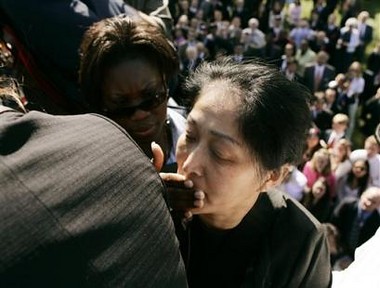This is the second post in a series on the government's Immigration Act Review Discussion paper [PDF]. The review aims to completely rewrite the Act to ensure a "firm, fair, and fast" immigration system; however many of the proposals seem to be emphasise the "firm" and "fast" aspects at the expense of fairness.
The first post in this series dealt with Chapter 5: Decision-making. This post will cover Chapter 6: Exclusion and Expulsion. As with Chapter 5, it is divided into three sections.
The first section covers "exclusion" - being forbidden to enter New Zealand. At present, the criteria for this are listed in s7 of the Immigration Act 1987, and in immigration policy. The reasons in the former include criminal offending, previous deportation, or the Minister thinking you are a Bad Person (a terrorist, potential criminal, or a "danger to the security or public order of New Zealand"); the latter include health, character, and failing to entry requirements laid out in policy. The key aim of this section is to see health and character requirements that are currently part of policy elevated to law - vastly reducing the scope for judicial review of those criteria. If accompanying provisions around exclusion are maintained, it would also remove any requirement to provide a reason for a decision - which is a recipe for abuse, particularly where "character" is concerned.
In addition to raising questions of oversight and accountability, there's also a question of proportionality here. It is one thing to refuse residency on the grounds of health or character, but its quite another to refuse entry. Without pretending to agree with the current use of these criteria, we have a far stronger interest in who will be living with us in the long-term than we do in who takes a holiday here.
Reading this section, it is difficult to escape the conclusion that the desire to entrench a character requirement in law is a reaction to recent controversial (would-be) visitors such as David Irving and Philip Nitschke, where immigration law has not seemed to offer the tools to deny entry to someone solely on the grounds that the government didn't like them. But the response - a catch-all "we don't need a reason" clause to catch anyone not otherwise excluded - is a licence for government abuse, not to mention arbitrary decision-making by officials. It raises significant questions of freedom of speech (which remember includes the freedom of New Zealanders to receive information as well as the freedom to impart it), and of discrimination or even victimisation on political grounds. This is simply not a tool we should be handing the government, and not a path we should be going down.
The second section deals with expulsion - or what is currently known as deportation or removal. There are two separate processes for this (hence the two names), as well as two more for revoking temporary or permanent permits. The aim is to replace these with a single, streamlined process. There would be a single list of criteria, covering everything from residence fraud to "national security", and meeting any of them would introduce automatic liability for expulsion (it is unclear who exactly decides whether the criteria are met - but I have a sneaking suspicion its nameless, faceless officials in secret again). The streamlining would come from removing the Minister from the loop (currently they must personally revoke residency permits, and approve all deportations of permanent residents who have been convicted of serious crimes), and (of course) limiting judicial oversight and avenues of appeal (fairness being seen as a barrier to chucking people out of the country). Left unstated in all of this is the fact that, in light of the proposals of Chapter 12, "automatic liability for expulsion" means automatic incarceration at the pleasure of the Immigration Service, again with little judicial oversight or protection.
I have no problem with streamlining processes, but again it seems that the changes are being driven by administrative convenience at the expense of fairness, and that the real rights and interests of migrants are being ignored. One particularly noxious example of this is that the proposals would dramatically erode the status of permanent residency. Currently there are strong protections in place to make it more difficult to eject permanent residents, on the basis that they have a stronger right and interest in remaining in New Zealand than overstaying tourists. The review recognises this very point in the chapter on appeals - but here, those stronger interests are simply ignored in favour of being able to kick people out of the country as quickly and easily as possible.
The third section deals with penalties for expulsion, and tweaks the current five year ban on re-entry to introduce graduated penalties, with no penalty for leaving voluntarily. This actually looks quite good, and is certainly better than the current system.
Next: Chapter 12: Detention
